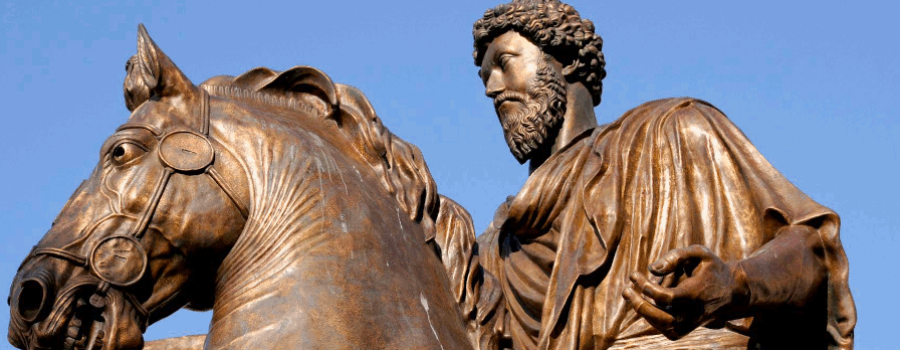Marcus Aurelius was one of the most respected Roman emperors who ruled from 161 AD to 180 AD. People knew him for his philosophical ideas, and his reign marked the peak of the Roman Empire. Despite his reputation as a fair and just ruler, there have been debates on his actions towards Christians during his reign. This article aims to explore the actions of Marcus Aurelius towards Christians. We will also examine the factors that may have influenced his decisions. Additionally, we will compare the modern perspective of both Aurelius and another controversial historic figure, Thomas Jefferson. This article intends to provide an unbiased examination into Marcus Aurelius and Early Christianity.
Background:
The Roman Empire was a polytheistic society that let people worship many gods and goddesses and even encouraged it. However, Christianity was a monotheistic religion that disapproved of the worship of other gods and held to the worship of just one God. Because they saw Christianity as a danger to both the social order and the traditional Roman religion, this led to hostility between Christians and the Roman government. Early Christians refused to sacrifice animals to Roman gods or worship the emperor as a deity. People viewed them as a threat to the authority of the emperor and the Roman state. As a result, those in power frequently charged Christians with betraying the state and persecuted them for refusing to practice the official religion.
Christianity challenged a number of social norms and behaviors in the Roman Empire. Christians, for instance, condemned infanticide and abortion, which were widespread in ancient Rome. Moreover, they fought against the practice of slavery and promoted treating everyone equally, regardless of social standing. These ideas put the Roman Empire’s established social structure and hierarchy in danger. Moreover, Christianity expanded quickly throughout the Roman Empire and finally emerged as a significant social and political force. Early Christian communities were cohesive and well-organized, and they might have presented a danger to the Roman state’s dominance and power.
Marcus Aurelius had mixed actions towards Christians. While he did not initiate any major persecution of Christians, there were instances where he allowed or even encouraged the persecution of Christians in the Roman Empire. In 177 AD, authorities executed a group of Christians in Lugdunum (modern-day Lyon) in Gaul. This was during the time of Aurelius’ rule. This event is known as the Lyons Martyrs.
Moreover, in 178 AD, Marcus Aurelius issued a rescript (a legal document) to the governor of Asia Minor, which instructed him to execute anyone who refused to renounce Christianity and worship the Roman gods. The rescript reads, “Those who have embraced this [Christian] sect…must be punished.” Aurelius likely responded to the growing influence of Christianity in the region and intended to curb its growth.
However, it is worth noting that Marcus Aurelius was not solely responsible for the persecution of Christians during his reign. There were other factors that may have influenced his decisions regarding Christianity. The Roman Senate was known for its hostility towards Christianity. The Senate may have pressured Marcus Aurelius to take action against them. Additionally, the military may have also been a factor in Marcus Aurelius’ decisions. The military was often hostile towards Christianity because of its pacifist beliefs. This Christian belief went against the warrior culture of the Roman Empire.
Comparison with Jefferson
It is important to approach historical figures’ actions with a multifaceted and contextual understanding. Though, it is difficult to compare Thomas Jefferson and Marcus Aurelius in terms of how they treated certain groups. It is possible if one remembers that both men behaved according to the social and cultural conventions of their era.
Thomas Jefferson was on of the Founding Fathers of the United States. Additionally, he wrote the majority of the Declaration of Independence. His insight and actions were monumental in the formation of the United States. Over his life, he also owned hundreds of slaves. Jefferson opposed the principle of the equality of all people, which is now widely acknowledged, and thought that whites were superior to African Americans.
Both Marcus Aurelius and Thomas Jefferson’s treatment of particular groups is highly troubling from a modern perspective. Yet it’s also critical to recognize that the social and cultural conventions of the times in which both men lived were very different. We should not only honor historical personalities for their merits but also examine their flaws and shortcomings.
A comprehensive perspective is crucial for assessing the contributions of such historical figures. Marcus Aurelius, for instance, treated Christians harshly. Yet, he also made important contributions to philosophy and political theory that are widely studied and respected today. Similar to Thomas Jefferson, who held slaves but was also instrumental in the establishment of the United States and helped forge its legal and political structures.
We should recognize that historical figures like Aruelius and Jefferson are complicated. It is shortsighted to just focus on their behavior toward particular groups without considering their major contributions. Even though the way Marcus Aurelius and Thomas Jefferson treated Christians and African-Americans is very troubling today, it is still possible to acknowledge their contributions to society while also being aware of their flaws and shortcomings.
Conclusion:
In conclusion, we know Marcus Aurelius for his philosophical ideas and just rule, but he had mixed actions towards Christians during his reign. He did not initiate any major persecution of Christians, but he allowed or even encouraged the persecution of Christians in some instances. There were also other factors that may have influenced his decisions, such as the influence of the Roman Senate and the military. Nonetheless, Marcus Aurelius’ actions towards Christians remain a subject of debate and continue to be studied by historians and scholars.









Most Commented Posts